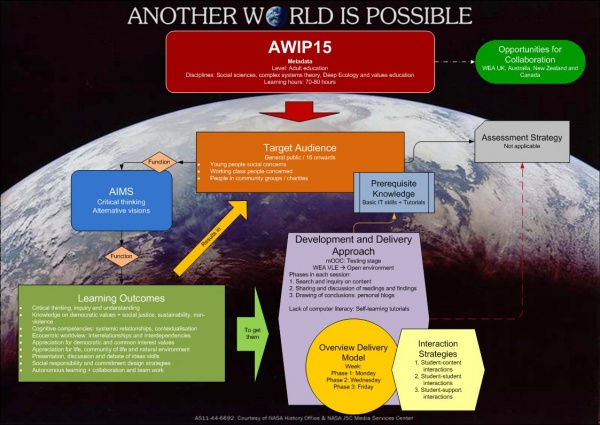User:Grian/courseplanningpage/Design blueprint
Contents
Metadata
- Level: Adult education
- Discipline(s): Social sciences (politics, economy, sociology, history), complex systems theory and deep ecology ecosophy, and values education
- Notional learning hours: 70 to 80 hours
- Hashtag: AWIP15 or AWIsP15
Intended target audience
This course is designed for all kind of people, regardless their background and qualification, for all age groups from 16 onwards, but it is particularly aimed at:
- Young people with social concerns or interests
- Men and women of working class concerned about our social or environmental situation
- People working or volunteering in community groups or charities
Prerequisite knowledge
- Basic working knowledge of office software, file management, and web browsing skills would be recommended. Instructions and self-study tutorials will be provided to create a blog and microblog account
Course aims
- To develop and demonstrate critical thinking on social, political and environmental issues
- To know social, political and environmental alternative visions not aligned with the prevailing neoliberal worldview
Learning outcomes
- Develop a critical thinking, inquiry and understanding of our social and ecological reality
- Develop an adequate knowledge on democratic values and principles, as well as on social justice, sustainability and non-violence
- Develop basic cognitive competencies in establishing systemic relationships, contextualising situations and problems
- Integrate an ecocentric worldview in which interrelationships and interdependencies are highly valued
- Develop a sound appreciation and respect for democratic and common interest values
- Develop a sound appreciation and respect for life, community of life and the natural environment
- Develop skills for the presentation, discussion and debate of ideas from a respectful and caring stance
- Design personal and/or collective strategies to implement their new social resposibility and commitment
- Develop competencies in autonomous learning and work, but also in collaboration and team work through social media
Development and delivery approach
This is a first attempt at implementing a micro open online course (mOOC) in Workers' Educational Association - Scotland, the Scottish office from WEA, an organization involved in lifelong learning for adults in UK and Australia. It will use the WEA virtual learning environment as a starting meeting point, but the idea is to expand our environment to other open resources such as blogs, wikis and other social media.
The course promotes a search and inquiry approach to the different contents, followed by a period of group sharing and discussion on their inquiries and readings, to finish with a phase of drawing conclusions, which they should expose in their personal blogs. All this involves an approach of autonomous learning blended with peer-learning interaction.
The possible lack of computer literacy in some learners (skills for web-navigation, ability to work with standard office applications and to register accounts for open web services) will be correlated with self-study support tutorials to promote their development in these areas.
Overview of the delivery model
At the beginning of each week (Monday morning), I will upload in our closed Facebook group page (and send to each student by email) the contents to inquiry that week, with a list of online resources corresponding to those contents. Students will have different options (and levels) to choose from within the contents of each week, and they may choose between reading the resources offered or investigate on their own in other directions that are most appealing to them. They can also choose to make their searches and set their conclusions individually or in teams.
By middle of the week (Wednesday afternoon), all the participants in our learning community will share the results and conclusions of their readings and inquiries through our social media platforms and/or our wikispace. From here, we will open a time of sharing and discussion among all the participants until Thursday evening. Note that these discussions could lead us to new lines of inquiry different from the original plan of this course.
Finally, on Friday, everyone will draft and upload his/her conclusions about all the issues researched, shared and discussed during the week in their own personal blog for the course. These personal blogs will be open to the public and may provide a new opportunity for comment, dialogue and respectful exchange of views.
Assessment strategy
Given the nature of WEA ("to provide access to education and lifelong learning for adults from all backgrounds, and in particular those who have previously missed out on education"), an informal approach to assessment is the only stratege applicable here. A formal assessment is not applicable because what we want is, simply, to inform people in social, political and environmental current issues, and train them in critical thinking and judgment, as well as in values and worldviews alternative to the prevailing ones in our society. Thus, we will use an informal formative assessment based on their blog posts, in which they will reflect about some of the topics covered in each session, and a final summative self-assessment on their general performance along the course.
Summary of interaction strategies
Student-content interactions
- Each session (week), learners will receive a short list of online resources about the content of that session. Those resources will have different levels of complexity, so that people can choose among them the most affordable content to their capabilities
- At the same time, learners will be encouraged to search and find their own resources on the same subject; that is, readings or videos that they may find more interesting, attractive or consistent with their preferences
- During the sharing and discussion period, learners will interact with the resources contributed by their peers in their own search, so getting in touch with other views, perspectives and inclinations on the subject
- Finally, during the phase of drawing conclusions, they will evaluate, value and integrate the different views in order to extract their own matured and critical perspective on this matter
Student-student interactions
- Learners can interact with each other through various means: microblog posts and comments, discussion forum posts, and personal blog posts and comments
- In the first phase, they could interact if they choose to perform the searching and discovery of new materials by teamwork
- In the second phase of each session, they will interact by sharing and discussing the different perspectives on the subject that each of them brings to the forum
- In the third and final phase, they could interact on their respectives conclusions through comments on their personal blogs or microblog posts
Student-support interactions
- Learners will be encouraged to use a peer-support question-and-answer forum to resolve their questions and problems
- Self-study tutorials will be provided for people who need help in web-navigation, working with office applications and registering and using of open web services
- If there are learners needing more complex information and knowledge, intructors can support them offering appropriate online and/or bibliographical resources on the different subjects
Opportunities for collaboration
Given the global reach of a mOOC, this course, organised by WEA Scotland and after passing its testing stage, could be offered in collaboration with some of the different offices of WEA in UK, Northern Ireland, Australia, New Zealand and some regions of Canada.

